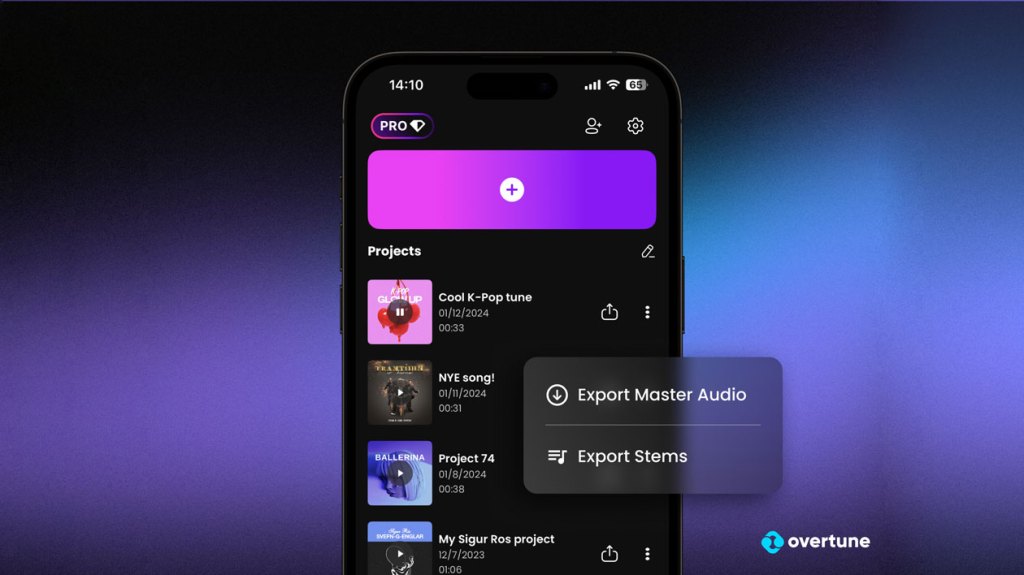Last January, Olivia King sat down at her dining room table and made a beat – in five minutes.
The Rhode Island-based pop/R&B artist doesn't play instruments or use music production software. Instead, she created her track with Overtune, a music-making app that lets users combine beats and samples from a wide range of instruments and other sounds, write and record vocals, and otherwise use a simple smartphone interface to make music intended for soundtrack. content on platforms such as TikTok, Instagram and YouTube. Overtune was developed in Iceland and released in 2020.
Now, King's use of the app is helping to expand Overtune's apps beyond social platforms and into more traditional publications. After using Overtune to add her own vocals to her five-minute beat, she made a video of herself performing the snippet of the song, then posted it on TikTok as part of a branding deal with the app. The video started gathering views. it now has more than 10 million of them.
Capitalizing on this interest, King created an entire song based on her original minute-long TikTok. A steamy ballad called “Unfinished Business,” the two-minute-and-18-second song was created entirely with Overtune beat packs and was released last Friday (June 21). It marks the first release through Overtune's new label service, which centers around a partnership with SoundOn, the music distribution model launched by TikTok in 2022 in the US and UK
SoundOn's integration with Overtune “fits right into the changing music industry,” says Overtune co-founder Jason Daði Guðjónsson. “Social media platforms like TikTok are at the forefront of this kind of transformation, and I think Overtune is perfectly positioned to help artists navigate the changing landscape by giving them the tools to create and now share and create revenue from their music”.
SoundOn is designed to help independent, emerging artists navigate TikTok, upload music, get paid for its use, advertise and promote on the platform, and distribute their music to external DSPs. Through its integration with Overtune, paid users can release Overtune-produced songs through SoundOn directly in the app, which has a free tier along with a subscription service priced at $9.99 per month. (This paid option also offers other features, such as exclusive beat packs.)
“I've worked with probably every distributor under the sun, but never before with SoundOn,” says King. “I'm excited about it, because TikTok has changed the music industry.”
Overtune's ability to produce music tailored for TikTok has attracted serious interest, with the company receiving $2 million in funding from Whynow media (founded by Mick Jagger's son, Gabriel Jagger), together with investments from a group that includes Guitar hero founder Charles Huang. Its advisory board includes the former head of Sony Music UK Nick Gatfield. And while the use of the app to create full-length songs is relatively new, along with King's song, Overtune was used in the creation of “Framtíðin er hällä” (“The future is here”), a song created for the National Radio TV New Year's Eve 2023 Station of Iceland's.
The founders of Overtune want to make creating music super simple by providing thousands of different sounds organized by tempo and pitch for easy matching. (Some commenters were suspicious that King had her knocking within five minutes, so she made another video recreating the process to prove it.) The app currently offers an AI helper that answers users' questions and develops other AI functions that are trained on Overtune's proprietary beat packs. Later this year, the company will also release a feature that lets users create loops using text prompts.
Overtune recently added an AI feature that lets users apply voice filters that mimic the voices of public figures like Donald Trump and Morgan Freeman and fictional characters like Marge Simpson. (This feature will soon be replaced by internally developed AI voices designed to modify individual voices, rather than reproduce those of celebrities.)
“The beautiful thing about it,” Guðjónsson says of the app as it stands now, “is that you don't need to know anything about technology or music to be able to create songs.”
Overtune sounds are copyright-free, so users can earn royalties from music created in the app when it's uploaded to TikTok and DSPs like Spotify and Apple Music. However, Guðjónsson says Overtune users are “gravitating towards TikTok”, making SoundOn “a natural addition to our offerings”.
The app also allows users to make music to the unique beat of TikTok. Artists can experiment with song snippets and then use SoundOn to upload them to TikTok and test them with audiences before finalizing the song and releasing it to more traditional DSPs.
Facilitating distribution is also just an extension of the company's larger mission. “Being a musician isn't supposed to be that hard,” says Guðjónsson. “As it is today, you have to have very expensive equipment and a big presence to get noticed by labels, but anyone can come through our services.”
For King, that convenience is a big part of the app's appeal.
“As an independent artist you have to be consistent, and the best way to be consistent is to be efficient,” he says. “With Overtune I can make a full demo in the app and then distribute it through SoundOn, which makes life easier as an independent artist.”



